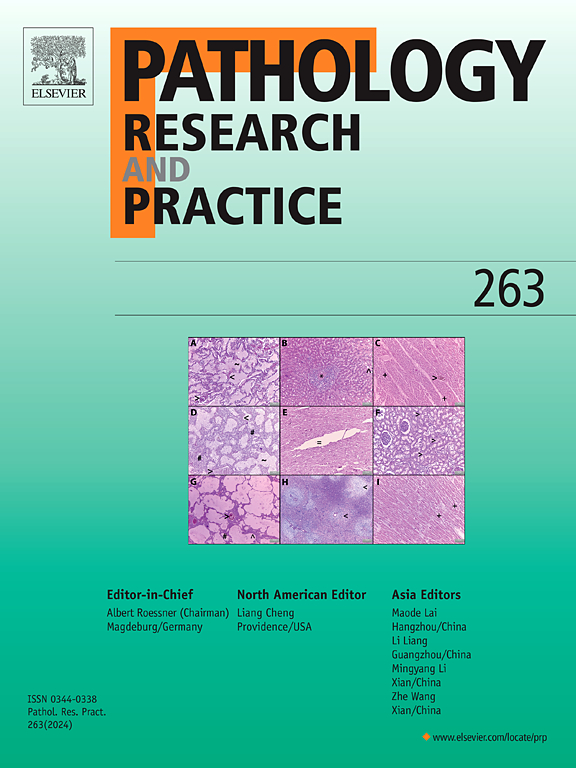Clinical insights into the mechanisms of infectious microbes and microbiota in chronic neurologic and psychiatric diseases
IF 2.9
4区 医学
Q2 PATHOLOGY
引用次数: 0
Abstract
Chronic neurologic and psychiatric diseases such as schizophrenia, depression, Parkinson's, and Alzheimer's are increasingly linked to infectious microorganisms and gut microbiota. This review explores how pathogenic microorganisms and microbial communities impact neuropsychiatric, neurodegenerative, and neuroinflammatory processes, highlighting the gut-brain axis' crucial communication network in influencing behavior and brain function. Infectious agents like bacteria, viruses, and fungi cause disease by causing neurotoxic reactions, disrupting the blood-brain barrier, and activating neuroinflammatory cascades. Gut dysbiosis impacts immunological homeostasis and neural transmission by altering the synthesis of metabolites from microorganisms, such as short-chain fatty acids and neurotransmitter precursors. Neurodegeneration and psychiatric diseases are influenced by molecular mechanisms such as toll-like receptor signaling, microglial activation, and mitochondrial dysfunction. This review highlights the potential of microbiota-targeted treatments such as probiotics, prebiotics, and microbiome transplantation as novel treatments for chronic diseases. Understanding the intricate interactions between infectious microorganisms, microbiota, and the central nervous system enables the formation of precision medicine strategies to challenge the rising incidence of neurologic and psychiatric diseases. Future research should explore causal relationships and identify specific microbial biomarkers to enhance early diagnosis, prevention, and personalized treatment plans.
慢性神经和精神疾病中感染性微生物和微生物群机制的临床见解
慢性神经和精神疾病,如精神分裂症、抑郁症、帕金森氏症和阿尔茨海默氏症,越来越多地与感染性微生物和肠道微生物群联系在一起。这篇综述探讨了病原微生物和微生物群落如何影响神经精神、神经退行性和神经炎症过程,强调了肠-脑轴在影响行为和脑功能方面的关键通讯网络。细菌、病毒和真菌等传染性病原体通过引起神经毒性反应、破坏血脑屏障和激活神经炎症级联反应而引起疾病。肠道生态失调通过改变微生物代谢物(如短链脂肪酸和神经递质前体)的合成,影响免疫稳态和神经传递。神经退行性疾病和精神疾病受toll样受体信号、小胶质细胞激活和线粒体功能障碍等分子机制的影响。这篇综述强调了微生物群靶向治疗的潜力,如益生菌、益生元和微生物群移植作为慢性疾病的新治疗方法。了解感染性微生物、微生物群和中枢神经系统之间复杂的相互作用,有助于形成精准医学策略,以挑战神经和精神疾病发病率的上升。未来的研究应探索因果关系并确定特定的微生物生物标志物,以加强早期诊断、预防和个性化治疗计划。
本文章由计算机程序翻译,如有差异,请以英文原文为准。
求助全文
约1分钟内获得全文
求助全文
来源期刊
CiteScore
5.00
自引率
3.60%
发文量
405
审稿时长
24 days
期刊介绍:
Pathology, Research and Practice provides accessible coverage of the most recent developments across the entire field of pathology: Reviews focus on recent progress in pathology, while Comments look at interesting current problems and at hypotheses for future developments in pathology. Original Papers present novel findings on all aspects of general, anatomic and molecular pathology. Rapid Communications inform readers on preliminary findings that may be relevant for further studies and need to be communicated quickly. Teaching Cases look at new aspects or special diagnostic problems of diseases and at case reports relevant for the pathologist''s practice.

 求助内容:
求助内容: 应助结果提醒方式:
应助结果提醒方式:


